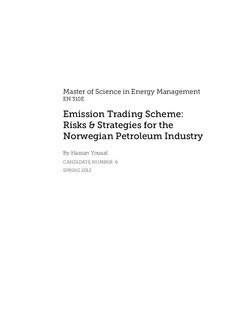| dc.contributor.author | Yousaf, Hassan | |
| dc.date.accessioned | 2012-07-31T09:45:32Z | |
| dc.date.available | 2012-07-31T09:45:32Z | |
| dc.date.issued | 2012 | |
| dc.identifier.uri | http://hdl.handle.net/11250/140923 | |
| dc.description | Masteroppgave i Energy management - Universitetet i Nordland, 2012 | no_NO |
| dc.description.abstract | The issue of climate change has become one of the greatest challenges to our living pattern. There is huge pressure on the countries to cut their greenhouse gas emission that caused the climate change. Kyoto protocol is one of the international agreement that binds the developed countries to mitigate the greenhouse gas emissions for the certain amount. Protocol has recommended three mechanisms to achieve emissions reduction target cost effectively. One of them is emission trading scheme.
The purpose of this study to explore what opportunities and Risks have emerged for the Norwegian Petroleum with the implementation of the Emission trading scheme. Institutional theory and Domestic political model has used to analyze the risks from the environmental regulations. Furthermore, this study has also focused deeply on what strategic actions industry undertaking in order to undermine the risks and utilize the opportunities. We have used Steger model and corporate model to examine the industry response to the EU ETS (European Emission trading Scheme).
We have found that main risk for the industry is increase in operating cost that would create the financial problems, delay the projects and may restrain the upcoming projects on the Norwegian continental shelf. The decrease in the demand of the fossil fuel due to tight environment regulations is another challenges for the industry but it is unlikely in short term. Currently, industry is striving to increase the electrification of the shelf and deploy CCS technology in order to reduce the significant amount of emissions. Furthermore, industry is paying attention on the efficiency measures that can also limit emissions in short period of time without heavy investment. Industry is also participating in CDM and JI to offset carbon emission cost effectively. In order to develop sustainable technologies, industry and other stakeholder engage in Research and Development Activities. | no_NO |
| dc.language.iso | eng | no_NO |
| dc.publisher | Universitetet i Nordland | no_NO |
| dc.subject | energy management | no_NO |
| dc.subject | energiledelse | no_NO |
| dc.title | Emission trading scheme : risks & strategies for the Norwegian petroleum industry | no_NO |
| dc.type | Master thesis | no_NO |
| dc.subject.nsi | VDP::Social science: 200::Economics: 210::Business: 213 | no_NO |
